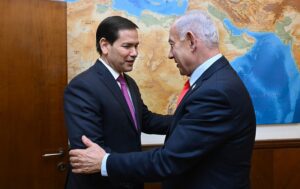‘My definition of great is very simple. It’s a country that can shape the world as well as be shaped by it’. Hunt insisted that celebrating Britain’s strengths – the ‘most respected military, the best universities, the biggest tech sector, more soft power, more hard power than anyone in Europe’ – does not need to be ‘jingoistic’. Instead, his, he insists, is a call to arms: ‘countries that have influence need to roll up their sleeves and sort out these problems’.
Why the UK must lead in technology
Reflecting on his time at the Treasury, Hunt described how he was struck by the sheer scale and diversity of the UK’s tech ecosystem, now valued at over £1 trillion and ranked third in the world behind only the United States and China.
‘We don’t talk about it very much because there aren’t many famous British tech names’, he admitted, but our technological ecosystem, to him, is both ‘exciting’ and ‘extraordinary’. Hunt cited Great Britain’s globally-leading universities (‘We’ve got the London, Oxford, Cambridge triangle’), and that outside the US, the UK is ‘the world’s biggest financial services sector’. He celebrated the ‘great’ spin-offs, science parks and tech parks owned by our universities – ‘every bit as good as what happens at Stanford and the Ivy Leagues’.
Hunt first announced his UK Silicon Valley ambition during his 2022 Autumn Statement, a period he described as ‘a pretty horrible moment’ for the economy. Despite the difficult context of rising energy prices and fiscal tightening, he said the idea was met not with ridicule but with recognition: ‘no one laughed. People understood we’ve got something going for us’. The former Chancellor believes the UK’s strengths in artificial intelligence, defence, and scientific innovation will underpin the country’s long-term economic growth.

‘My definition of great is very simple. It’s a country that can shape the world as well as be shaped by it’.
How to Power Growth
Hunt said the UK’s ambition to rival the US and China in technology depends on keeping British start-ups in the UK once they are successful and developed: ‘we’ve got to create an infrastructure where homegrown companies can IPO in the UK without having to go to NASDAQ or elsewhere once they hit unicorn status’. He claimed that British pension funds currently work at loggerheads to growth, rarely investing in domestic innovation, as opposed to other countries: ‘In the US, Canada and Australia, if you do an IPO, you can be confident that domestic pension funds will pour in. In the UK, less than 4% of their holdings are UK-based’.
He insisted that as a result, ‘North Americans are making more money out of our great hopes for the future than Brits are’, noting that 45% of British venture capital funding comes from North American pension funds, compared to just 3% from British ones.
Hunt also warned that energy prices could become a critical barrier to AI development and data-driven industries. ‘We have the highest energy costs in Europe. By 2034, data centres will use more electricity than the entire Indian economy. We’ve got to sort out our energy prices – they’re just too high’. Lower energy costs, he argued, are essential not only for competitiveness but also for the UK’s ambition to be a leader in AI infrastructure.
‘No one laughed. People understood we’ve got something going for us’.
Reforming the NHS
Jeremy Hunt’s belief that structural NHS reform is vital to accelerating technological adoption; that it is evidence of national greatness, the ‘most centralised health system in the world’, but challenged with healthcare innovation.
Hunt argued that excessive central control has made the system risk-averse and slow to adopt innovation. He called for decentralisation, giving more autonomy to hospitals and local health trusts; akin to the reforms that improved state schools over the past two decades: ‘when we gave headteachers power over budgets and accountability, we saw English schools become the best in the Western world. There’s no reason the NHS can’t do the same’.
He said decentralisation would not only reduce bureaucracy but also empower NHS leaders to partner more effectively with start-ups in diagnostics, predictive analytics and drug discovery. He insisted that were he to repeat his time as Health Secretary, he would have scrapped national targets, criticising them for making the system ‘too cumbersome and bureaucratic’.
AI Regulation
Hunt also addressed the UK’s position between the EU’s heavily regulated model and the US’s laissez-faire approach to artificial intelligence. He expressed his support for the US model: one of minimising regulation, ‘but being prepared to clear up the mess if there is one’.
Hunt clearly feels that Europe’s restrictive approach risks stifling innovation: ‘The EU asks, ‘Why don’t we have a Google or Microsoft?’ You’ll never get one with that kind of heavy-handed regulation’. But he did praise the UK’s tradition of independent, pragmatic regulation, noting that the country has led on digital safety and transparency, including age verification laws. He emphasised that it is most important to ‘keep regulators independent and responsive’.
The Politics of Optimism
Throughout the discussion, Hunt’s emphasis consistently rested on matters of national confidence. From the tech sector to health and regulation, he argued that the UK already has the talent, institutions and industrial base to compete globally, but that structural reform and investment are needed to unlock its full potential.
Hunt cited Donald Trump’s social media strategy as a positive harbinger of ‘this new world we’re in’ – that the US president seems able to tap into the public psyche, giving him a ‘unique ability to both listen and communicate’. His ability to do so, Hunt argues, rests on his spending three hours every day posting online – something that, Hunt feels, in British politics, should be ‘prioritised’.
In a political climate often defined by pessimism, Hunt clearly seeks to be a voice of pragmatic optimism: that Great Britain is indeed great, already equipped with the tools, the talent, and the institutions it needs to thrive – it simply needs the courage to use them. The question remains to be seen whether a public who have withstood so much pessimism will treat such optimism with cynicism, or support.




